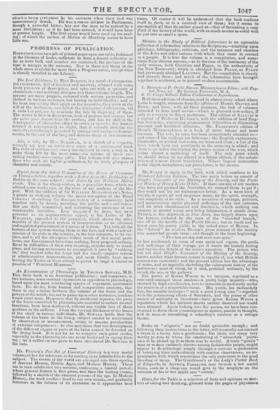Mr. SMITH is again in the field, with added numbers
to his Standard Library Edition. The two parts before us consist of /lligh's Narrative of the Mutiny of the Bounty, and the Poeti- cal ltbrItsqf Henry Kirke White. If there are any of our readers who have not perused the Narrative, we counsel them to get it ; they could not lay out sixteenpence better. As a mere book of travels, it equals all and surpasses many, for the spirit, strength, and simplicity of its style. As a narrative of courage, patience, and perseverance under physical sufferings of the last extreme, and an utter abandonment and desolation, which nothing can surpass in mental terror save living inhumation, it stands alone. 13veoN, in the shipwreck in Don Juan, has largely drawn upon the horrors endured by the crew of the "crowded launch," cast off in the middle of the Pacific Ocean ; but in truth and in- terest even his poetry yields to the naked prose of BLIGH. In the " Island " he readers BuiGn's prose account of the mutiny into somewhat prosaic verse ; and though in the lines beginning " TIca boat and ship shall never meet again,"
he has condensed, in verse of rare spirit and vigour, the perils and sufferings of their voyage, yet it wants the homely feeling and day-by -day details of the actor's narration. The person who has not read Bligh's Narrative of the Mutiny of the Bounty, knows neither what human nature is capable of, nor what British seamen can surmount : and the present edition has the advantage of notes, and an appendix sketching the subsequent history of the mutineers ; most of whom, be it said, perished untimely, by the sword, the sea, or the gallows.
The poetry of KIRKE WHITE is, we imagine, reprinted as a sure card amongst those readers—a pretty large majority—who, strained by high excellencies, love to luxuriate in mediocrity under the sanction of a respectable name. His youth, his melancholy fate, his amiable feelings—" such a good young man "—together with the patronizing efforts of SOUTHEY, and the praise of other names of authority in literature—have given KIRKE WHITE a reputation which his intrinsic merits neither deserved nor would have attained. Again looking into his poems, we have been con- strained to deem them commonplace in matter, puerile in thought, tied in manner resembling a schoolboy's exercise or a college theme.


























 Previous page
Previous page